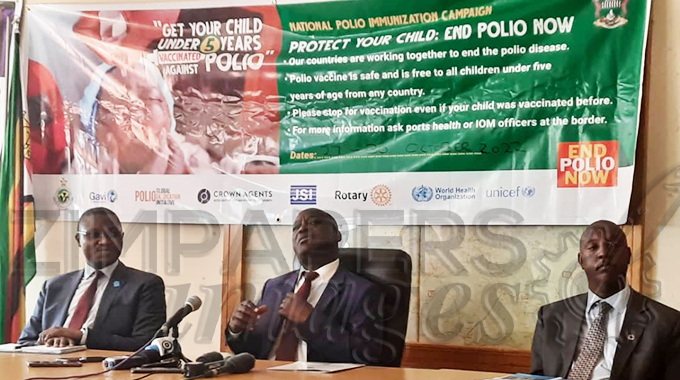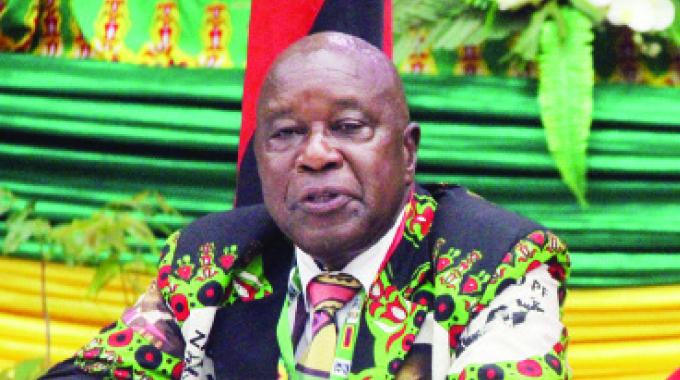Polio vaccination campaign launched

Rumbidzayi Zinyuke-Senior Health Reporter
Following outbreaks of polio in Malawi and Mozambique, Zimbabwe is making sure the disease stops at the border by double vaccinating all children under five, regardless of their previous vaccination history, with the major campaign starting today to give the first dose this month and the second dose in December.
Zimbabwe last recorded a wild polio virus case in 1989 and was declared polio-free by the World Health Organisation in 2005, but is joining the regional vaccination drive in Malawi and Mozambique, where cases have been recorded, and the other two major neighbours of Zambia and Tanzania to make sure the disease is once again totally suppressed.
Many children are already vaccinated, as the polio vaccine is one of the standard vaccines given all young children in Zimbabwe’s routine primary health programme, but because of the cases in the region it has been decided to make sure.
The campaign is being rolled out with technical and funding support from WHO, Unicef, Gavi, the Global Polio Eradication Initiative (GPEI), Bill and Melinda Gates Foundation, Rotary Club, Crown Agents and other partners.
Speaking at the official launch of the Zimbabwe vaccination campaign yesterday, Health and Child Care Deputy Minister Dr John Mangwiro said the country had not reported any polio case but vaccination remained the main strategy to mitigate potential import of the disease.
“Polio is a dangerous disease which causes debilitating paralysis and death particularly among children and is targeted for eradication globally.
The administration of two rounds of supplementary doses of oral polio vaccine to all children under five years is a cost-effective public-health measure to boost protection levels among our children and avert import of the polio virus from affected countries.
“It is common knowledge that we share strong socio economic and historical links with both affected countries, Malawi and Mozambique, and there are high chances of cross border spread of the disease,” he said.
Polio is a contagious viral disease that, in its most severe form, causes nerve injury leading to paralysis and difficulty in breathing and children below five years are at high risk of contracting it.
Deputy Minister Mangwiro said in addition to the vaccination drive, the Ministry would also conduct intensified surveillance and active search for acute flaccid paralysis, ensure high level advocacy to commit key stakeholders to polio eradication, training and equipping health workers at all levels for outbreak preparedness and response, and community engagement awareness campaigns on polio.
The first round of polio vaccination in Zimbabwe is running from today to Sunday while the second round is scheduled for December 1 to 4 targeting all children below five years of age regardless of vaccination status.
The blitz will include door-to-door polio mobilisation and vaccination in all areas in addition to all the health facilities in the country which will continue administering the polio vaccine. Special mobile teams are also expected to cover the hard-to-reach areas.
“Sufficient oral polio vaccines have been procured and together with all other campaign resources have been prepositioned in all provinces, districts and health facilities and our teams are prepared to hit the ground running from tomorrow,” said Dr Mangwiro.
He said the vaccination drive feeds into the broader Government vision of a healthy and prosperous nation as enshrined in the National Health Strategy and the National Development Strategy (1).
WHO country representative Dr Alex Gasasira commended the Ministry for the timely interventions to protect children against risk of infection.
“As we are all aware, the risk of import of polio virus into Zimbabwe increased very significantly following the confirmation of several cases of polio in Malawi and Mozambique. We call upon parents and communities to present their children aged under 5 years for vaccination over the next 3 days.
“Let us all do our best to support all parents, including those in hard-to-reach communities to get their children immunised,” he said.
Dr Gasasira said it was important to strengthen routine immunisation and disease surveillance to ensure that polio is kept out of Zimbabwe.
UNICEF representative for Zimbabwe Dr Tajudeen Oyewale the polio vaccine was effective in preventing the disease.
“If polio exists anywhere, it is a threat to children everywhere. The polio virus knows no geographical borders and it can easily spread and paralyze children.
“And the impact of polio paralysis has lifelong implications for children and by extension their families, the society, and the Nation.
“Our efforts today at preventing polio therefore remain the most cost-effective action that guarantees quality life for our children,” he said.
The Centres for Disease Control (CDC) estimates that since 1988, the polio vaccine has prevented more than 10 million cases of paralysis and saved the lives of approximately 500 000 children.
Dr Oyewale said UNICEF would continue supporting the coordination of the response as well as support to social mobilisation and community engagement, vaccine procurement, vaccine security and management and monitoring.








Comments